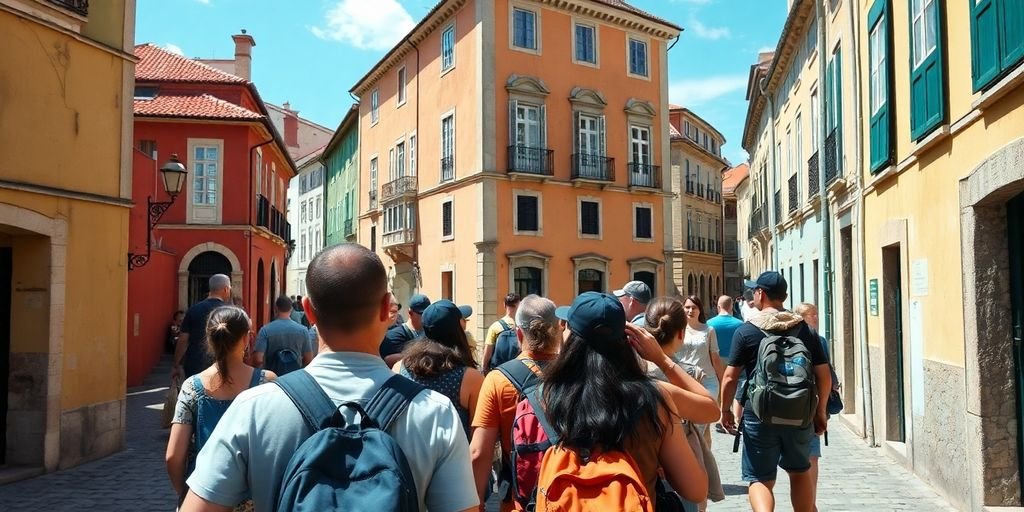
Moving from the US to Portugal is an exciting adventure, but it comes with its own set of challenges. While the beautiful landscapes and vibrant culture are enticing, many Americans find the transition more complex than they anticipated. From navigating the language barrier to dealing with bureaucratic hurdles, there’s a lot to adapt to.
I’ve seen firsthand how important it is to be prepared for these adjustments, especially when considering the job market and education system. Let’s explore some key hurdles that US expats might face when relocating to Portugal and how to tackle them!
Key Takeaways
- Learning Portuguese is pretty important, even if many people speak English.
- The education system differs from the US, which can be tough for families.
- Finding a job that matches your skills might be harder than expected.
- Dealing with bureaucracy can be frustrating and time-consuming.
- Adapting to cultural differences takes time and effort.
Navigating Language Barriers in Portugal

Importance Of Learning Portuguese
Moving to Portugal means grappling with a new language. While English is commonly spoken in cities like Lisbon and Porto, stepping outside these urban areas often requires Portuguese. Mastering Portuguese isn’t just about convenience; it’s essential for truly immersing into local life. The language is complex, with gendered nouns and tricky verb conjugations, making it a challenging yet rewarding endeavor. Learning Portuguese helps in everyday tasks, from shopping to dealing with bureaucracy, and opens doors to deeper social connections.
Challenges In Daily Communication
Even in major cities, you might find yourself paying more for goods if you don’t speak the local language, which, although illegal, does happen. Outside these areas, English speakers might hit a wall. Misunderstandings are common, and without Portuguese, it can be tough to navigate simple interactions.
- Shopping: Prices might vary based on your language proficiency.
- Public Transport: Announcements and signs are often in Portuguese.
- Social Interactions: Building friendships can be harder without a common language.
Impact On Social Integration
Language is a bridge to culture. Without it, you might feel isolated. Speaking Portuguese helps you join community events, understand local customs, and feel more at home. It’s not just about speaking; it’s about listening and engaging.
“Living in Portugal without knowing Portuguese can feel like watching a movie without subtitles. You get the gist, but miss the nuances.”
For those thinking about moving to Portugal, language is a key step in settling down comfortably. It’s not just a skill but a tool for integration and belonging.
Understanding The Education System
Differences In Curriculum
Moving to Portugal means adapting to a different educational system. The curriculum can vary significantly from what American families are used to. In Portugal, there’s a strong emphasis on theoretical knowledge, especially in subjects like mathematics and science. This might be a shift for students used to more hands-on or practical learning experiences. Additionally, the teaching methods can be more traditional, with a focus on lectures and examinations. This structure can be challenging for students who thrive in interactive or collaborative environments.
Challenges For Families With Children
Families relocating to Portugal often face hurdles when it comes to education. Language barriers are a major concern, as many public schools teach primarily in Portuguese. While there are bilingual and international schools available, they can be costly and may not be accessible to everyone. Parents might worry about their children’s ability to adapt socially and academically in a new environment. Moreover, the lack of English language programs in some areas can make it difficult for children to keep up with their studies.
Access To International Schools
For families looking for an education system closer to what they know, international schools in Portugal are a viable option. These schools offer a variety of curricula, including the International Baccalaureate, and cater to expats from around the world. They provide an environment where children can learn in English while being immersed in a multicultural setting. However, these schools can be expensive, and spots are often limited, making it important for families to plan ahead. Despite the cost, many find that international schools offer a smoother transition for their children, balancing familiarity with the opportunity to experience a new culture.
Employment Opportunities And Job Market
Job Market Dynamics
Moving to Portugal might sound like a dream, but when it comes to finding a job, things can get tricky. The job market in Portugal is quite different from what many Americans are used to. While there are opportunities, particularly in sectors like tourism, technology, and renewable energy, the market isn’t as vibrant or diverse as in the U.S. Salaries tend to be lower, and some expats find themselves struggling to find positions that match their skills and experience.
Recognition Of Qualifications
One of the hurdles expats face is the recognition of their qualifications. Not all degrees or certifications are automatically recognized in Portugal, which can be a real headache if you’re trying to continue your career without interruption. It’s important to research and understand what steps you might need to take to get your qualifications recognized. Sometimes, this might involve additional training or certification, which can be time-consuming and costly.
Challenges For Skilled Workers
For skilled workers, the job market can be particularly challenging. Even if you have a wealth of experience and a solid resume, finding a position that leverages your skills might not be straightforward. Language barriers can also play a role here. While English-speaking roles exist, especially in tech and tourism, proficiency in Portuguese is often essential for many positions. Networking and understanding local job search practices can significantly enhance your prospects, but it takes time and effort to build these connections.
Moving to a new country for work can be exciting yet daunting. It’s important to weigh the pros and cons and prepare for the unique challenges that come with job hunting in a foreign land.
Bureaucratic Hurdles For Expats

Complexity Of Administrative Processes
Moving to Portugal often means dealing with a complicated web of paperwork. Expats frequently encounter challenges when applying for residency permits, dealing with tax paperwork, or registering with local authorities. The administrative processes can be lengthy and demanding, requiring patience and persistence. Many find the need to navigate these procedures daunting, especially when unfamiliar with the local system.
Language Barriers In Bureaucracy
Even though English is widely spoken, the official language for most bureaucratic tasks is Portuguese. This can create significant hurdles for those not fluent in the language. Misunderstandings can arise, leading to errors in paperwork or delays in processing. To mitigate these issues, many expats choose to hire bilingual professionals or translators to assist with navigating the bureaucratic maze.
Seeking Professional Assistance
Given the complexities involved, seeking professional help is often advisable. Hiring a local representative or gestor, who is familiar with the Portuguese bureaucratic landscape, can ease the burden significantly. These professionals can help with everything from translating documents to understanding local regulations. They act as a bridge between expats and the often perplexing administrative system, ensuring smoother transitions and fewer headaches.
While Portugal offers a rich culture and beautiful landscapes, navigating its bureaucracy can be frustrating due to lengthy processes and delays in obtaining permits and dealing with government matters. Living in Portugal presents both advantages and challenges.
Healthcare Access And Considerations

Quality Of Healthcare Services
Portugal offers a robust healthcare system that’s both accessible and affordable. The public healthcare system, known as Serviço Nacional de Saúde (SNS), provides free medical care to citizens and residents. This system ensures essential services are within reach for everyone, but the quality of care can vary depending on the location and facility. Many expats opt for private healthcare, which is often more affordable compared to other Western European countries. Private clinics are popular for their shorter wait times and high-quality service, and most healthcare professionals in these settings speak English, easing communication for expats.
Language Barriers In Medical Settings
While the quality of healthcare is commendable, language can pose a significant barrier. Although many doctors and medical staff in private clinics speak English, this is not always the case in public hospitals. For expats, especially those who don’t speak Portuguese, this can be a hurdle. It’s beneficial to learn basic Portuguese medical terms or have a translator during visits to navigate through medical appointments effectively.
Familiarity With US Healthcare
Adjusting to a new healthcare system can be daunting for many Americans. The familiarity and comfort of the US healthcare system often make it a challenge to adapt to the differences in Portugal. For instance, the process of seeing specialists or getting certain treatments might differ. Moreover, the lack of immediate family support, which many rely on back home, can affect long-term healthcare decisions. Some expats choose to maintain a balance by having private medical insurance to ensure they have access to a range of healthcare services, which can enhance their overall experience in Portugal.
Moving to a new country involves adapting to its healthcare system, which can be one of the most challenging aspects for expats. Understanding the nuances of Portugal’s healthcare can help ease this transition and ensure that you receive the care you need.
Cultural Adjustments And Misunderstandings
Navigating Social Norms
Moving to a new country like Portugal means getting used to different social norms. You might notice that personal space is a bit different here—people stand closer and greetings often include cheek kisses. It’s all about adapting and understanding these nuances to avoid awkward moments. Learning the local customs can really help you fit in better and make those first few months a little smoother.
Building A Social Network
Making friends in a new country can be tough, especially if you’re not fluent in the language. But don’t worry, the Portuguese are known for being friendly and welcoming. Joining clubs or taking part in community events can be a great way to meet people. Here are some tips:
- Attend local festivals: They’re fun and a great way to mingle.
- Join expat groups: These can offer support and friendship.
- Take language classes: Not only do you learn, but you meet others in the same boat.
Coping With Cultural Differences
Everyday life in Portugal might be quite different from what you’re used to. From meal times to work-life balance, the pace is different. Lunch, for example, is a big deal here and can last a couple of hours. Embrace these differences as part of your new adventure. It might take time, but you’ll find your rhythm.
Adjusting to a new culture is like learning a new dance; it takes time, patience, and a willingness to step out of your comfort zone.
For many Americans moving to Portugal, these cultural adjustments can be a mixed bag. While some find it exciting, others might struggle at first. But with an open mind and a bit of effort, settling into your new life can be a rewarding experience.
Financial Considerations For Expats

Moving to Portugal might seem like a dream with its beautiful landscapes and vibrant culture, but understanding the financial landscape is crucial for a smooth transition.
Cost Of Living In Portugal
While Portugal is often celebrated for its affordability compared to other European countries, the cost of living can vary significantly depending on the city or region. Lisbon and Porto, for example, tend to be more expensive than smaller towns. Housing costs can eat up a big chunk of your budget, especially if you prefer to live in city centers. Groceries and dining out might be cheaper, but imported goods can be pricey.
- Housing: Rent prices in Lisbon can be steep, averaging around €1,200 for a one-bedroom apartment in the city center.
- Utilities: Monthly utilities (electricity, heating, cooling, water, garbage) for a standard apartment can cost about €100.
- Transportation: Public transport is affordable, with monthly passes ranging from €30 to €40.
Tax Implications
Portugal’s tax system can be complex for newcomers. The country offers a Non-Habitual Resident (NHR) tax regime, which can be beneficial, but understanding the nuances is key. Expats must navigate between the Portuguese tax obligations and their home country’s tax requirements. Some might find themselves paying taxes in both countries if they’re not careful.
- NHR Scheme: Offers tax breaks for foreign income for up to 10 years.
- Double Taxation: Make sure to check if your country has a tax treaty with Portugal to avoid being taxed twice.
- Social Security Contributions: Even as an expat, you might be required to contribute to Portugal’s social security system.
Income Disparities
The income you earn in Portugal might not match what you’re used to in the US. Salaries can be lower, which might affect your lifestyle if you’re not prepared. It’s important to budget wisely and perhaps consider additional income sources if necessary.
“Adjusting to a different financial environment can be challenging, but with careful planning and realistic expectations, it’s possible to thrive in Portugal.”
For more tips on managing finances as an expat in Portugal, including insights on banking, taxes, and budgeting, explore essential tips for expatriates.

Lifestyle Preferences And Climate Adaptation
Adjusting To The Mediterranean Climate
Moving to Portugal means experiencing a Mediterranean climate, which can be quite different from what many Americans are used to. Summers can be hot, especially inland, while coastal areas might surprise with cooler winters. This can be a bit of a shock for those expecting endless sunshine. Adapting to these seasonal shifts is key to settling in comfortably. Some expats find themselves adjusting their daily routines, like planning outdoor activities during cooler parts of the day in summer.
Impact Of Seasonal Changes
Portugal’s weather is mostly mild, but it does have its quirks. The summer heat can be intense, sometimes limiting outdoor activities. On the flip side, the winter months can bring more rain than some might expect. These seasonal changes can affect lifestyle preferences significantly. It’s not uncommon for new residents to find themselves investing in a good raincoat or learning to appreciate the art of the afternoon siesta to beat the heat.
Lifestyle Differences Compared To The US
The pace of life in Portugal is generally slower and more relaxed compared to the hustle and bustle of many American cities. This can be a refreshing change, but it might also take some getting used to. People often value leisure time, and there’s a strong emphasis on enjoying life rather than just working. For those used to a fast-paced environment, this shift can be both a challenge and a blessing. Embracing this lifestyle can lead to a more fulfilling experience, but it requires a bit of patience and openness to change.
Embracing Portugal’s laid-back lifestyle and climate might mean stepping out of your comfort zone, but it also offers a chance to enjoy a different rhythm of life. The sunny days and relaxed pace can bring a sense of peace and well-being, making the adaptation process worthwhile.
Conclusion
Moving to Portugal can be an exciting adventure, but it’s not without its hurdles. From grappling with language barriers to navigating the local bureaucracy, Americans face a unique set of challenges. The education system might not align with what families are used to, and finding a job that matches one’s skills can be tough. Plus, the slower pace of life and different climate might not suit everyone. Despite these challenges, many find the experience rewarding, embracing the rich culture and beautiful landscapes. But for those who find the adjustment too daunting, returning to the familiar comforts of the U.S. remains an option. Ultimately, it’s about weighing the pros and cons and deciding what feels right for you.
Frequently Asked Questions
Is speaking Portuguese necessary for living in Portugal?
Yes, while many people speak English, especially in big cities, knowing Portuguese helps with everyday tasks and making friends. Language barriers can make it tough to handle paperwork and connect with locals.
How does Portugal’s weather compare to the USA?
Portugal has a mild, Mediterranean climate that many people love. But some Americans might find the winters near the coast colder than expected or the slower pace in warm areas a bit challenging.
What are the main bureaucratic challenges for expats in Portugal?
Dealing with paperwork in Portugal, like visas and other documents, can be tricky. Language barriers make it harder, so getting help from a local expert is often a good idea.
How does Portugal’s education system work for American families?
Portugal has both public and private schools, but they might teach differently than in the US. Families often look for private or international schools, which can be hard to find outside big cities.
Can retirees enjoy living in Portugal for a long time?
Many retirees like Portugal for its low cost and nice weather. But being far from family and different healthcare systems might make some think about moving back to the US.
Is Portugal’s healthcare good for American expats?
Portugal’s healthcare is good and not too expensive, but some services might need special care. Some Americans might prefer the US system because they’re used to it, especially for long-term care.

